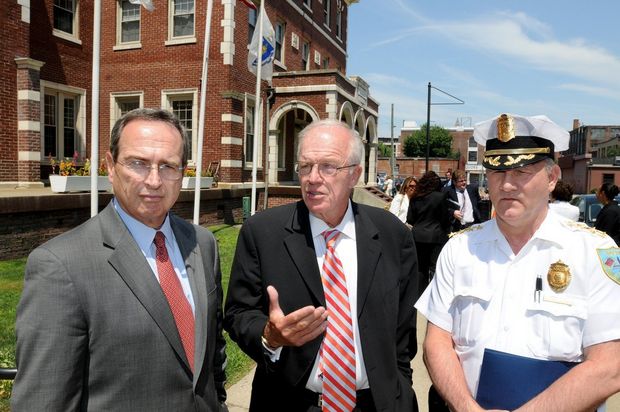As MGM prepares to build its casino in Springfield’s South End, it’s bought up a cluster of properties, evicting businesses and organizations. Among them is the Western Massachusetts Correctional Alcohol Center. It’s a substance abuse treatment center for up to 182 inmates. For nearly thirty years, it’s rented a building on Howard Street, in the center of MGM’s planned casino. It does not have the money to move to a new location. That’s grabbed the attention of many state officials, but no one is promising a solution. With that, I went for a visit.
MORE: WMCAC Could Relocate Outside Springfield
Ron Robinson is speaking to an auditorium of about fifty men, all wearing suits and ties. They’re a broad mix of ages and races. Many look a bit bored, staring at their shoes or off into the distance. But Robinson, who was once a resident here, tells them adamantly about the benefits of this facility.
“Thank God for this program, because this program changed my life,” Robinson says.
Robinson is a substance abuse counselor himself now. He’s one of the thousands of success stories that the staff of the facility, known as WMCAC or simply “Howard Street,” point to. It serves the four western Massachusetts counties, and the residents, as the inmates here are called, are all incarcerated for offenses related to drug or alcohol addiction. It’s far from a typical prison. The center is minimum security, and co-ed.
“Male in the unit, ladies,” says Della Blake, director of Howard Street, announcing my arrival.
“This is the women’s unit. Like I said it’s an 18 bed unit, this is one of their day rooms, sometimes it’s a group room,” she says as she walks me through the living area.
There are no cells. It’s more like a college dorm – bunk beds, lockers, posters on the wall. The place looks a bit tired, but it’s clean and neat, especially the beds. Residents are required to make their bed with precise hospital corners. It’s about structure, Blake says.
“When they’re detoxing or they’ve been living active addiction, they ain’t getting up in the morning making their bed, or taking showers, or having any grooming concerns,” Blake says. “So those are a lot of the disciplines that they have to get back in to in order to present themselves as changed, responsible, recovering people.”
Residents are encouraged to go to AA meetings outside the facility, accompanied by volunteers.
Though the center originally focused on alcohol, the mission has changed with the times, according to Howard Street’s program manager Joanne Burke.
“We noticed ten years ago that the heroin was beginning to pop up its ugly head, and it had to do with prescription pills,” she says.
Burke says several recovering heroin addicts started a support group at that time and named themselves “hope fiends.” When it started, the group had about four people. Now, out of the seventy inmates in the initial phase of treatment, Burke says anywhere from thirty to forty of them are in the group.
Burke says the growing heroin and opiate problem makes Howard Street more relevant than ever, despite its eviction that’s supposed to happen at the end of this month. Hampden County Sheriff Michael Ashe, whose office oversees the center, says there’s no way it will leave by that date. He wants to move it to a former nursing home on Mill Street in Springfield, but doesn’t have the money to do it.
“We’re working on trying to secure $4 million,” says Ashe.
That would pay for renovations and moving costs, and come from a fund for casino “mitigation” from the state gaming commission. There’s a total of $17 million the commission can distribute, and it’s paid for by the three licensed casino companies in Massachusetts, including MGM.
MGM did not respond to multiple requests for a taped interview. But in a statement, a spokesperson says MGM has been in discussions with the Sheriff’s office, and has tried to be “as accommodating and engaged as possible.” The company is offering relocation funding, which would put WMCAC in line for about $130,000.
State government is paying attention. A Baker administration official says they are in ongoing talks with the Sheriff, and understand the need for a new facility, but he says state money is tight.
Meanwhile, Ashe says he has no backup plan. If funding doesn’t come through and the treatment center actually is evicted, where would residents go?
“I’m not thinking of that right now,” Ashe says. “I’m thinking that we’re going to make this work.”
At Howard Street, director Della Blake says the uncertainty is weighing on the residents.
“They are concerned about where we’re going, but that’s our responsibility as staff,” Blake says. “Our faith in our sheriff sets the tone for us as staff, and we set the tone for the residents. We have faith in our sheriff.”
The gaming commission meets Thursday, and mitigation funding is on the agenda.
Update: A spokesperson for the Hampden Sheriff’s office says the eviction date is now March 31st. Regardless, WMCAC does not plan to leave the building by the eviction date.
